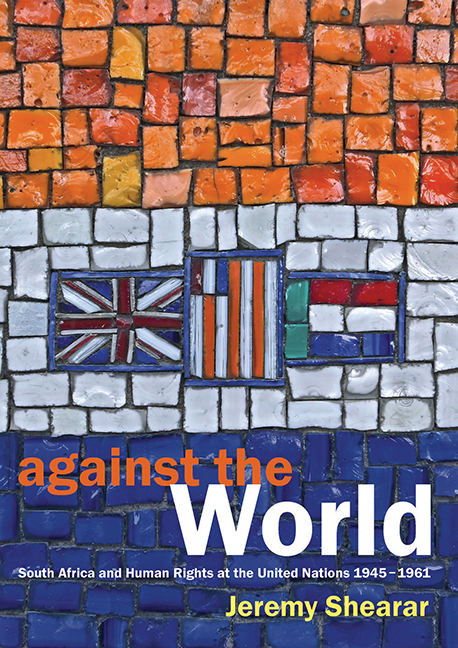Book contents
- Frontmatter
- Contents
- Acknowledgements
- Abbreviations
- Introduction: ‘What we have lost is all the more reason for cherishing what survives’
- 1 Quod severis metes: Birth of the United Nations
- Chapter 2 South African Indians
- 3 Universal Declaration of Human Rights
- 4 International covenants on human rights
- 5 United Nations surveys of human rights issues
- 6 Evolution of human rights at the United Nations
- 7 State sovereignty at issue
- 8 Apartheid on the agenda
- 9 Shadow of Sharpeville
- 10 General relations with the United Nations
- 11 Concluding observations
- Appendix: Selected provisions of the United Nations Charter
- Sources and references
- Index
5 - United Nations surveys of human rights issues
Published online by Cambridge University Press: 19 March 2020
- Frontmatter
- Contents
- Acknowledgements
- Abbreviations
- Introduction: ‘What we have lost is all the more reason for cherishing what survives’
- 1 Quod severis metes: Birth of the United Nations
- Chapter 2 South African Indians
- 3 Universal Declaration of Human Rights
- 4 International covenants on human rights
- 5 United Nations surveys of human rights issues
- 6 Evolution of human rights at the United Nations
- 7 State sovereignty at issue
- 8 Apartheid on the agenda
- 9 Shadow of Sharpeville
- 10 General relations with the United Nations
- 11 Concluding observations
- Appendix: Selected provisions of the United Nations Charter
- Sources and references
- Index
Summary
United Nations Yearbook on Human Rights
In addition to its work on an international bill of rights, the CHR charged the Secretary- General, at its first meeting in 1946, with the preparation of a UN Yearbook on Human Rights (YHR). The object of the YHR was to collate all declarations and bills on human rights in force in member states. For those which did not possess bills of rights, the Secretariat felt that statements outlining existing legislation and practice should be prepared by recognised experts in constitutional law. In SA, it approached Mr H.J. May, ‘a solicitor practising in the Transvaal’. May noted that the South Africa Act of 1909 contained no guarantees of human rights and equal treatment often found in other constitutions. Acts of Parliament were the supreme law of the land and often discriminated against non-Europeans in political, property, social and economic rights. Protection against their infringement had to be sought in the courts, which rigorously upheld the law ‘without respect of colour or race’.
The Secretariat passed May's draft to the Union government for approval but the DEA considered it unsuitable as it dealt primarily with recent SA discriminatory legislation, which had been subjected to criticism in the UN. The DEA informed the Secretariat that it would provide a revised draft ‘in which the conception of human rights prevailing under South African Common Law and the South African constitution will be set out in its correct perspective’.
To assist them in preparing a new statement, the DEA sent the law advisers a copy of the text of the UK submission, which was drafted for the YHR with the approval of the UK government by Sir Cecil Carr, Counsel to the Speaker of the House of Commons. It set out the general nature of the British legal system and the checks on arbitrary rule, before dealing specifically with the various freedoms enjoyed by British subjects, namely personal freedom, freedom of speech, freedom of the press, religious freedom, freedom of assembly and association and freedom from want. The paper contributed by the SA law advisers followed the general pattern of the Carr text and, judging from the various drafts on Justice's file also of the May submission. The first draft claimed that legal discrimination was ‘small compared with the inherent liberties which [non-white peoples] enjoy’.
- Type
- Chapter
- Information
- Against the WorldSouth Africa and Human Rights at the United Nations 1945–1961, pp. 105 - 130Publisher: University of South AfricaPrint publication year: 2017



